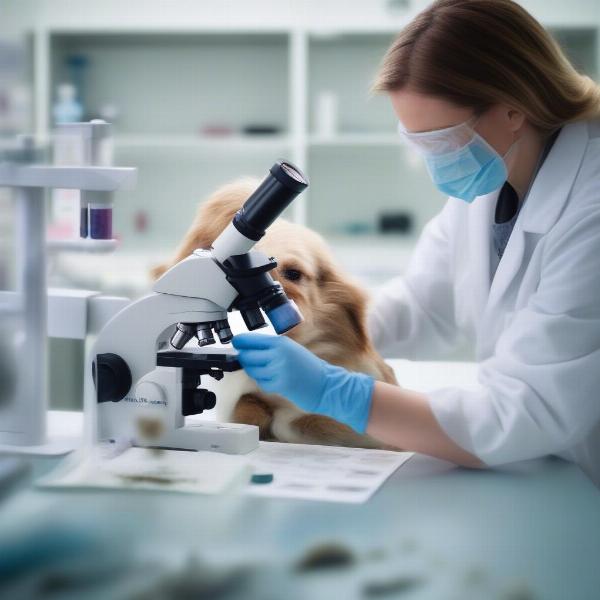Hookworms are intestinal parasites that can cause serious health problems in dogs, especially puppies. These microscopic worms latch onto the lining of the small intestine and feed on blood, leading to anemia and other complications. Recognizing the symptoms of hookworm in dogs is crucial for early diagnosis and treatment. This article provides a comprehensive guide to understanding hookworm infections in dogs, including symptoms, diagnosis, and treatment options.
Recognizing the Telltale Signs: Hookworm in Dogs Symptoms
Hookworms can be difficult to detect with the naked eye, making it essential to be vigilant about potential symptoms. Early signs of hookworm infection may be subtle, but as the infestation progresses, more noticeable symptoms appear. Common hookworm in dogs symptoms include:
- Anemia: Pale gums, weakness, lethargy, and rapid breathing can indicate anemia caused by blood loss.
- Diarrhea: Often dark and tarry due to the presence of digested blood.
- Weight loss: Despite a normal appetite, infected dogs may lose weight due to malabsorption of nutrients.
- Poor coat condition: A dull, dry, and brittle coat can be a sign of underlying health issues, including hookworm infestation.
- Itchy paws: Some dogs may experience itchy paws, especially between the toes, as larvae can penetrate the skin.
- Coughing: This can occur if the larvae migrate through the lungs.
Diagnosing Hookworm Infections in Dogs
If you suspect your dog has hookworms, it’s crucial to consult a veterinarian for a definitive diagnosis. The vet will perform a fecal examination to detect hookworm eggs under a microscope.
What Happens During a Fecal Exam for Hookworms?
The vet will collect a fresh stool sample from your dog. The sample is then examined under a microscope to identify hookworm eggs. This simple and non-invasive procedure is the most reliable way to diagnose hookworm infections.
 Fecal Exam for Hookworm Diagnosis
Fecal Exam for Hookworm Diagnosis
Effective Treatment Options for Hookworm in Dogs
Once diagnosed, your veterinarian will prescribe an anthelmintic medication specifically designed to kill hookworms. Several effective deworming medications are available, and the vet will choose the most appropriate one based on your dog’s age, health, and the severity of the infection.
How Does Deworming Medication Work?
Deworming medication targets adult hookworms in the intestines, disrupting their lifecycle and eliminating them from the body. Multiple doses may be required to eliminate all the worms and prevent re-infestation. The veterinarian will provide specific instructions on the dosage and frequency of administration.
Preventing Hookworm Infections
Preventing hookworm infections is essential for maintaining your dog’s health. Regular deworming, proper hygiene, and environmental control are key preventive measures.
- Regular veterinary check-ups and fecal examinations are crucial for early detection and treatment of hookworms.
- Maintaining a clean environment by regularly picking up feces can help prevent the spread of hookworm larvae.
Conclusion
Hookworm infections can pose significant health risks to dogs, but early diagnosis and treatment can prevent serious complications. Being aware of the symptoms of hookworm in dogs, coupled with regular veterinary check-ups, is essential for ensuring your furry friend’s well-being.
FAQs
- How can I tell if my dog has hookworms? Look for symptoms like pale gums, weakness, diarrhea (often dark and tarry), weight loss, poor coat condition, and itchy paws. Consult a veterinarian for a definitive diagnosis through a fecal exam.
- How are hookworms diagnosed? A fecal examination by a veterinarian is the most common method for diagnosing hookworms. The vet will examine a stool sample under a microscope to identify hookworm eggs.
- How are hookworms treated? Anthelmintic medication prescribed by a veterinarian is the standard treatment for hookworms.
- Can hookworms be prevented? Yes, regular deworming, proper hygiene, and environmental control can help prevent hookworm infections.
- Are hookworms contagious to humans? Yes, hookworm larvae can penetrate human skin, causing a skin irritation known as cutaneous larva migrans. Practice good hygiene after handling dog feces.
- How often should my dog be dewormed for hookworms? Consult your veterinarian to determine the appropriate deworming schedule for your dog, based on their age, lifestyle, and risk factors.
- What should I do if I think my dog has hookworms? Contact your veterinarian immediately for diagnosis and treatment.
ILM Dog is your trusted source for expert advice on dog care and well-being. We offer comprehensive resources on dog breeds, health, training, nutrition, grooming, and much more. Visit our website at ILM Dog for valuable insights and practical tips to help you provide the best possible care for your canine companion. Contact us today at [email protected] or +44 20-3965-8624 for personalized assistance from our team of dog experts.